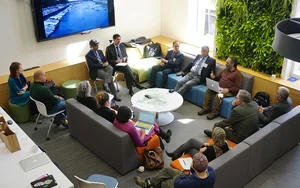Water Diplomacy in the Kabul River Basin
Experts from Afghanistan and Pakistan were recently brought together by CAPA and the Institute of Environmental Diplomacy and Security (IEDS) at the University of Vermont to discuss issues around the contested Kabul River Basin. Participants came to an agreement on a framework -- to collect data and create strategies -- modeled after successful projects in Israel, Jordan, Peru, Ecuador, and Cyprus.

Ten experts (five from Afghanistan and five from Pakistan) gathered online and in person at the Peace Centre at Dawson College in Montreal for a week-long in-depth dialogue to find effective solutions and opportunities for sustainably resolving conflicts generated by the looming water crisis in the Kabul River Basin. The workshop was convened by the Center for the Advancement of Public Action (CAPA) at Bennington College and the Institute of Environmental Diplomacy and Security (IEDS) at the University of Vermont with the hope of developing a framework for sharing the transboundary water resources in Afghanistan and Pakistan in the Kabul River Basin.
The sessions brought science and civil society experts and community activists from both countries together. The participants explored the political, environmental, social, technical, scientific, and regulatory challenges in this region. They discussed and developed frameworks to proceed on environmental and science diplomacy (Track 2) and community action and engagement (Track 3) between Afghanistan and Pakistan over shared transboundary water resources in the Kabul River Basin in accordance with international conventions and treaties.
This week-long convening led to the establishment of the Transboundary Water In-cooperation Network (TWIN), a network of networks that connects transboundary partners globally. TWIN plans to design a citizen science-based water quality monitoring system for the Kabul River Basin; develop a comprehensive set of measures to promote community and scientific cooperation; develop strategies for community awareness and engagement; and organize science and civil society water diplomacy events. Our network partners have been inspired by successful environmental cooperation projects in Palestine, Israel, and Jordan, as well as in Peru, Ecuador, and Cyprus.
The following organizations represented during this convening included: Community Motivation and Development and Organization (CMDO), Coordination of Afghan Relief (COAR), House of Afghans, Aga Khan Foundation (AKF), German Development Bank (KFW), Arava Institute for Environmental Studies (AIES), i.GREENS, Institute of Environmental Diplomacy and Security (IEDS) at the University of Vermont, and the Center for the Advancement of Public Action (CAPA) at Bennington College. The next TWIN meeting on public and science diplomacy on the Kabul River Basin is planned for next year in Kathmandu, Nepal.